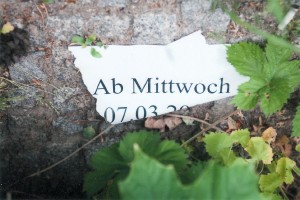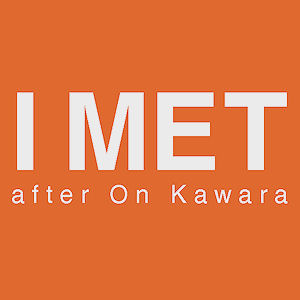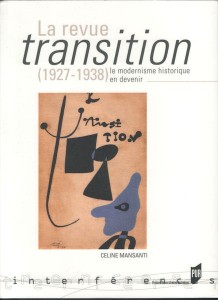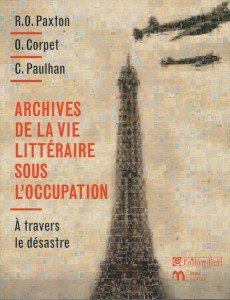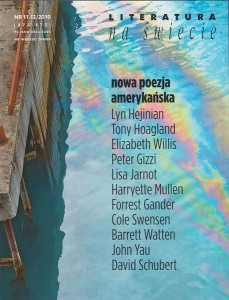At our recent conference in Mainz, Germany, on collectivity and literature, David Simpson (a critic of romanticism who made the theory/cultural studies turn in the 70s and has produced a number of significant and wide-ranging works since then) presented a keynote lecture titled “After 9/11: The Fate of Strangers,” on the position of the foreigner (stranger; étranger; Fremde) in writing. Simpson cited a range of post–9/11 fiction and the spontaneous outpouring of poetry opposed to American military intervention in Iraq and Afghanistan. I mentioned that, through the last decade, poets had also been interested in the status of other languages in their work as foreign and strange, and were investigating questions of alterity, opacity, and mistranslation through a range of experimental strategies. An example of the preservation of an individual word as “stranger” in a language appears with the German context of Fremdwörter, which are generally pronounced as closely to their original language as possible. Adorno had written, suggestively, on this embedding of the other in German: “Die Fremdwörter sind die Jüde der Sprache” (Foreign words are the Jews of language). A bit later, Simpson asked me for particulars of this practice (Cary Nelson also wondered what the hell was interesting about opacity and mistranslation; I responded that it was a site of cultural learning). I had just seen three readers in Berlin exploring the poetics of multi-languaged embedding and mis/translation (Eugene Ostashevsky, Uljana Wolf, and Christian Hawkey, with the texts by recently deceased Russian poet Alexei Parshchikov added to the mix) at an art space in Prenzlauer Berg, Berlin, named (significantly) “Ausland.” Not feeling that all the examples I knew of were coming to mind readily, I took the question to Facebook and have started a short bibliography. The criteria for inclusion here are: investigatng the opacity and otherness of multiple languages using experimental techniques; interrogating translation as a cultural politics; and publishing the results after 2001 (with a few exceptions). The list will be updated as more titles become available (contact b/c at barrett.watten@gmail.com).
Multi-Language Poetry After 2001
(compiled by Barrett Watten and friends; in process)
Dorantes, Dolores. SexoPUROsexoVELOZ and Septiembre. Trans. Jen Hofer. Kenning Editions, 2008. “Translator’s Note.” Other language (OL): Spanish.
Funkhouser, Chris. “perdido em transcreation: chuck(l)in’ globalization.” OL: French, Spanish, Portuguese. Available here.
Hadley, Jozuf Bradajo. 2 Poems. With CD. Tinfish, 2006. OL: Hawaiian Pidgin.
Iijima, Brenda. Glossematics, Thus. Least Weasel, 2011. OL: t/k.
Kanae, Lisa Linn. Sista Tongue. Tinfish, 2001. OL: Hawaiian Pidgin.
Karasick, Adeena. The House that Hijack Built. Talonbooks, 2004. “Phat Freitag” and the homolinguistic translation of the Sefer Yetzirah (The Book of Letters). OL: Hebrew, German.
———. Amuse Bouche. Talonbooks, 2009. “What Have You Done with My Cabbala?” OL: Hebrew.
Kim, Myung Mi. Commons. U California P, 2002. “Works.” OL: Korean.
Lang, Abigail, and Thalia Field. A Prank of Georges. Essay Press, 2010. “From a poetry translation workshop hosted by Tamara Foundation in Paris, 2008. OL: French.
Stalling, Jonathan. Yingeleshi: Sinophonic English Poetry and Poetics. Denver: Counterpath, 2011. OL: Chinese.
Torres, Edwin. The All-Union Day of the Shock Worker. Roof, 2001. “A Nuyo-Futurist’s Manifestiny.” OL: Spanish.
———. The Popedology of an Ambient Language. Atelos, 2007. “The Impossible Sentence”; “Transla-lation-tion.” OL: Spanish.
Tuntha-obas, Padcha. composite. diplomacy. Tinfish, 2005. OL: Thai.
Zolf, Rachel. Neighbour Procedure. Coach House, 2010. “Innocent Abroad.” OL: Hebrew, Arabic.
[More entries t/k]

